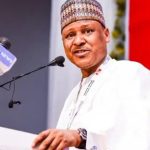By Gloria Nwafor
The Organised Private Sector of Nigeria (OPSN) has called on the Federal Government to put in place guidelines that would tackle the menace of disinformation on businesses.
It said the need became necessary, as the impact of the threat has caused financial and reputational damages on businesses of their member-companies.
Speaking on behalf of three major business association in the OPSN, comprising Nigeria Employers’ Consultative Association (NECA), Manufacturers Association of Nigeria (MAN) and National Chambers of Commerce, Industries, Mines and Agriculture (NACCIMA), the Director-General of (MAN), Segun Ajayi-Kadir, said it is imperative for the government to legislate a law guiding disinformation, stating that if not addressed it would be a huge challenge for businesses.
Ajayi-Kadir, spoke during a roundtable discussion on disinformation in Nigeria’s private sector, in collaboration with the Centre for International Private Enterprise (CIPE), through the service of Nextier, an Africa-focused public policy consulting firm, to conduct a study on the impact of disinformation on Nigeria’s private sector companies.
He added that the OPSN would continue to drive campaigns against disinformation in order to tackle the menace at greater scale.
“It will not be possible to completely eliminate it but we will ensure we achieve it. We will ensure we implore technology to make it robust, create enough awareness, seek government’s support and make people liable for damages done to our businesses. OPSN will continue to drive campaigns against disinformation against the private sector,” he said.
Founding Partner, Nextier, Patrick Okigbo, in his presentation, said the private sector is highly susceptible to disinformation campaigns, resulting in loss of customer revenues and that the damage may linger even after the information is debunked.
As part of the survey conducted, he acknowledged that Nigeria’s significant disinformation challenge seriously threatens business survival, even as he lamented that Nigeria’s disinformation is worsening
According to him, specific factors that increase the ease with which disinformation spreads worsens the challenge.
“These disinformation attacks, which are becoming almost daily, aim to engender a lack of trust in the targeted business. Nigerians create most of the disinformation while other Nigerians inadvertently disseminate them, not necessarily for malicious reasons,” he said.
He said the private sector must contend with the spread of false information with the attendant risk of its negative impact on their economic prospects.
He also stated that disinformation could lead to the closure or suspension of business operations, as well as negatively impact the economic sector.
Okigbo noted that beyond the conversations, the organised private sector would need to design a framework that would allow it to seek penalties against perpetrators of misinformation.
He said: “Nigeria’s legal system is not as robust as we desire. So, if we pass through the law courts, it might take time for you to get a judgment. The OPSN needs to set up its own penalty system, where it can sanction the perpetrator while the Nigerian legal system takes its course.
“Nigeria requires multi-sectoral coordination efforts to address disinformation challenges; government, private sector, technology companies, traditional and social media firms and educational institutions, among others.”
Source: The Guardian








